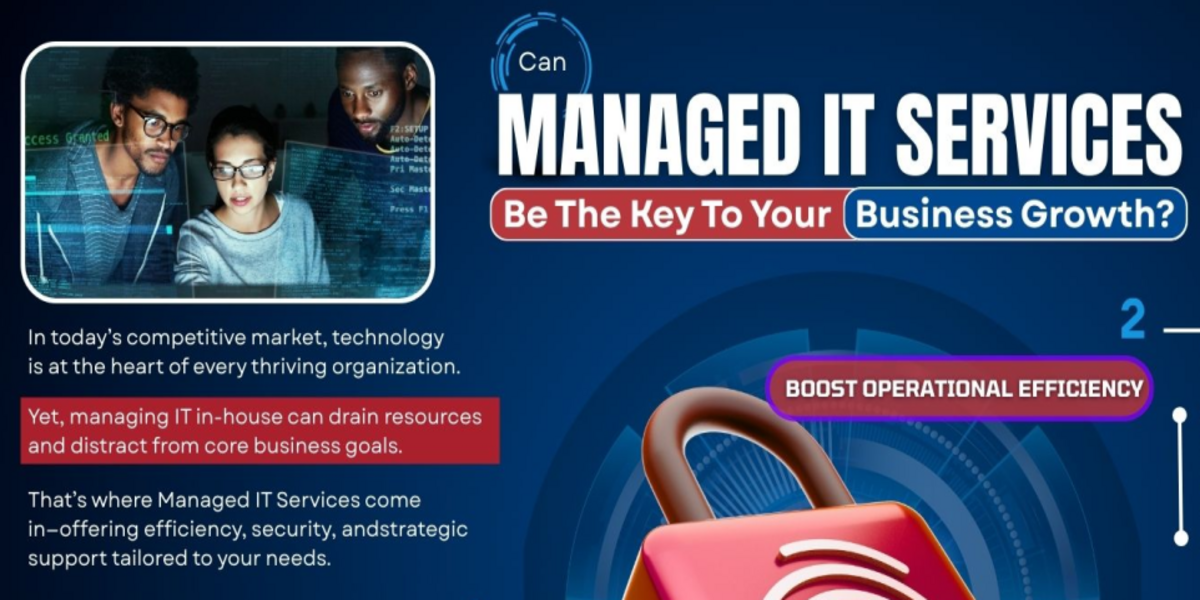IT outsourcing is a necessity for a majority of Canadian businesses in 2024. Choosing a Managed IT Services Provider can significantly impact your business’s performance, security, and scalability.
With quick advancements in the industry, businesses find it challenging to focus on their core operations while also managing a complex and resource-intensive IT infrastructure.
This tendency reflects on the IT outsourcing trends in Canada. In 2023, the IT outsourcing market volume was USD 10.45 billion which is projected to reach USD 11.76 billion in 2024, dominating the market.
This guide will help you navigate the process of selecting managed IT services for businesses, ensuring that you make an informed decision that aligns with your unique needs.
Understanding Managed IT Services for Businesses
Choosing a managed IT services provider can get easier when you know what you want. Let’s understand the role of managed IT services for businesses in Canada.
A managed IT services provider offers comprehensive IT support and management, handling everything from network security and data backup to cloud services and IT consulting.
These providers offer different service models, including on-site and remote support, tailored to meet the specific needs of businesses. When choosing a managed IT services provider, consider your business’ unique needs to decide how you’d like to receive their services.
Key Considerations When Choosing a Managed IT Services Provider

Selecting the right Managed IT Services Provider can greatly impact your business’s efficiency, security, and overall success. To ensure you make an informed choice, it’s essential to evaluate several key considerations thoroughly:
Security
Security should be at the forefront of your decision-making process when choosing a Managed IT Services Provider. Cyber threats are constantly evolving, and a robust security framework is crucial to protect your business data and IT infrastructure. Evaluate the following security aspects:
- Security Certifications: To ensure the highest security standards, verify if the provider utilizes tools and systems that adhere to recognized global certifications like ISO 27001, SOC 2, or CISSP. This demonstrates their commitment to robust security practices.
- Data Encryption: Ensure the provider uses strong encryption methods for data at rest and in transit. This includes securing communications between your business and the provider’s systems.
- Firewall and Intrusion Detection Systems: Verify that the provider employs advanced firewall protections and intrusion detection/prevention systems to monitor and block malicious activities.
- Regular Security Audits: The provider should conduct regular security audits and vulnerability assessments to identify and address potential weaknesses.
Recommended Read: How to Conduct Network Security Assessment
- Incident Response Plan: Inquire about the provider’s incident response plan and their ability to respond swiftly to security breaches.
Experience and Expertise
When choosing a managed IT services provider, their experience and expertise should be critical indicators of their ability to handle your IT needs effectively. Consider the following:
- Industry Experience: Look for a provider with experience in your specific industry. They will have a better understanding of the unique challenges and regulatory requirements relevant to your sector.
- Technical Expertise: Evaluate the qualifications and certifications of the provider’s team. Certifications from vendors like Microsoft and Cisco indicate a high level of technical proficiency.
Scalability
Your business’s IT needs will evolve. So, when choosing a managed IT services provider, ensure that they can scale their services accordingly. Consider the following scalability aspects:
- Flexible Service Plans: Ensure the provider offers flexible service plans that can be easily adjusted to accommodate your business growth.
- Resource Availability: Verify that the provider has the resources, both in terms of technology and personnel, to scale their services as your business expands.
- Cloud Solutions: Providers offering cloud-based services can provide greater scalability and flexibility, enabling you to add or remove resources as needed.
Service Level Agreements (SLAs)
SLAs are crucial documents that define the level of service you can expect from the provider. Carefully review the following aspects of the SLAs:
- Response Times: Ensure the SLAs specify guaranteed response times for different types of support requests (e.g., critical issues and general inquiries).
- Uptime Guarantees: Look for uptime guarantees that align with your business needs. High uptime percentages (e.g., 99.9%) indicate reliable service.
- Performance Metrics: SLAs should include clear performance metrics and benchmarks to measure the provider’s service quality.
Remediation Terms: Understand the terms and conditions for service remediation in case the provider fails to meet the SLA requirements.
Cost
While cost is an important factor, it’s better to look beyond the price tag when choosing a managed IT services provider. This helps in understanding the true value you can get from them. Consider the following cost-related aspects:
- Transparent Pricing: Choose a provider with transparent pricing models that clearly outline the costs of services, including any additional fees for extra support or services.
- Cost-Benefit Analysis: Conduct a cost-benefit analysis to compare the provider’s pricing against the range and quality of services offered.
- Hidden Costs: Be wary of hidden costs that may not be apparent initially. Ensure you understand all potential charges associated with the services.

Support and Customer Service
Reliable support and customer service are vital for maintaining smooth IT operations. Evaluate the following support aspects:
- 24/7 Support: Choose a provider that offers round-the-clock support to address any issues that may arise outside regular business hours.
- Response Times: Inquire about the average response and resolution times for support requests.
- Support Channels: Ensure the provider offers multiple support channels, such as phone, email, and live chat, for convenient access to help.
- Dedicated Account Managers: Having a dedicated account manager can improve communication and ensure a deeper understanding of your business needs.
Technological Capabilities
The technological capabilities of the provider are a key determinant of their ability to meet your IT needs effectively. Assess the following aspects:
- Advanced Tools and Technologies: Ensure the provider utilizes the latest tools and technologies for IT management, including remote monitoring, automation, and cybersecurity solutions.
- Cloud Services: Providers with strong cloud service offerings can enhance your business’s flexibility and scalability.
Recommended Read: 8 Ways Cloud Solutions Streamline Business Operations
- Disaster Recovery Solutions: Evaluate the provider’s disaster recovery and business continuity plans to ensure your business can quickly recover from disruptions.
Compliance and Regulatory Adherence
Depending on your industry, you may have specific regulatory requirements to adhere to. Ensure the provider can help you maintain compliance with relevant regulations:
- Regulatory Knowledge: The provider should have a deep understanding of the regulations affecting your industry, such as GDPR, HIPAA, or PCI DSS.
- Compliance Audits: Inquire if the provider conducts regular compliance audits and assists with regulatory reporting requirements.
Customization and Personalization
Every business has unique IT needs, and a one-size-fits-all approach may not be effective. Assess the provider’s ability to offer customized solutions:
- Tailored Services: Ensure the provider can tailor their services to match your specific business needs and goals.
- Personalized Support: Look for a provider that offers personalized support and solutions based on an in-depth understanding of your business.
Step-by-Step Selection Process
To ensure you choose the right Managed IT Services Provider, follow this step-by-step selection process:
1. Assess Your Needs: Identify your business’s specific IT needs and objectives. Consider factors such as the size of your company, industry requirements, and growth plans.
2. Research Providers: Conduct thorough research to identify potential providers. Look for those with experience in your industry and a solid reputation. Microsys, for instance, is known for its reliable and experienced IT management services.
3. Evaluate Expertise and Experience: Assess the expertise and experience of each provider. Check their track record, client testimonials, and case studies to gauge their capabilities.
4. Review Security Measures: Evaluate the security measures and protocols each provider employs. Ensure they offer comprehensive security services, including regular audits and updates.

6. Compare Service Models: Determine whether on-site or remote services best suit your needs. Consider the pros and cons of each model and how they align with your business operations.
Examine SLAs: Review the SLAs of each provider carefully. Ensure they meet your requirements for response times, availability, and performance metrics.
7. Request Proposals: Request detailed proposals from shortlisted providers. Compare their services, pricing, and terms to make an informed decision.
8. Check References: Contact references provided by the providers. Ask about their experiences, the quality of service, and any issues they encountered.
9. Conduct Interviews: Interview the providers to get a sense of their approach, communication style, and commitment to customer service.
10. Make Your Decision: Based on your research, evaluations, and interviews, choose the provider that best meets your needs and aligns with your business goals.
Common Pitfalls to Avoid When Choosing a Managed IT Services Provider
Selecting the right Managed IT Services Provider (MIT) is a critical decision for your business. However, there are common pitfalls that many organizations encounter during this process.
Here’s a more detailed look at these common pitfalls:
1. Ignoring Scalability
Many businesses select a provider based on their current needs without considering future growth. This short-sighted approach can lead to challenges as your business expands, requiring you to switch providers or upgrade services unexpectedly.
- Avoidance Strategy: Assess your long-term business goals and growth projections. Choose a provider that offers scalable solutions and has a proven track record of supporting businesses through different growth phases. Ensure they have the resources and flexibility to accommodate your future needs without major disruptions.
2. Overlooking Security
Security is a fundamental aspect of IT services. A provider with inadequate security measures can expose your business to cyber threats, data breaches, and regulatory fines.

- Avoidance Strategy: Prioritize security by thoroughly evaluating the provider’s security protocols, certifications, and incident response plans. Look for providers with robust security frameworks, regular audits, and strong encryption practices. Verify that they comply with relevant industry standards and regulations.
3. Focusing Solely on Cost
While cost is an important factor, choosing the cheapest option can result in subpar service, inadequate support, and insufficient security measures. A low-cost provider may cut corners, leading to higher long-term costs due to inefficiencies and security breaches.
- Avoidance Strategy: Perform a comprehensive cost-benefit analysis. Consider the value of services offered relative to their cost. Focus on finding a provider that offers a balance of quality, reliability, and affordability. Evaluate their track record, client satisfaction, and the breadth of services included in their pricing.
4. Neglecting SLAs
Service Level Agreements (SLAs) define the expected service standards and response times. Neglecting to review SLAs thoroughly can result in unmet expectations, service gaps, and disputes.
- Avoidance Strategy: Carefully review and negotiate SLAs with potential providers. Ensure the SLAs clearly outline response times, uptime guarantees, performance metrics, and remediation terms. Align these agreements with your business needs and ensure they are detailed and specific.
5. Lack of Due Diligence
Failing to conduct thorough research and background checks on potential providers can lead to partnering with unreliable or inexperienced providers. This can result in poor service quality, security vulnerabilities, and financial losses.
- Avoidance Strategy: Conduct comprehensive due diligence. Research the provider’s history, reputation, and client reviews. Check references and request case studies or testimonials from similar businesses. Verify their financial stability, technical expertise, and industry experience.
Microsys – Your Reliable Managed IT Services Partner
When it comes to choosing a Managed IT Services Provider, Microsys stands out as a reliable and experienced partner. We offerManaged IT Services in Markham and other cities in GTA, Ottawa, and Montreal tailored to meet the unique needs of each client.
- Experience and Expertise: With 20+ years of experience in the industry, Microsys has developed a deep understanding of various business sectors. Our team of skilled professionals is equipped to handle complex IT challenges and provide innovative solutions.
- Robust Security: Microsys prioritizes security, implementing advanced measures to protect your data and IT infrastructure. From encryption to intrusion detection, we ensure your business remains secure from evolving threats.
- Scalability: Microsys offers scalable solutions, allowing your IT infrastructure to grow alongside your business. Whether you’re a small startup or a large enterprise, we can accommodate your needs.
- Comprehensive Support: With 24/7 support and a dedicated customer service team, Microsys ensures that your IT issues are addressed promptly and effectively. Our proactive approach to IT management minimizes downtime and enhances productivity.
- Technological Innovation: Microsys stays ahead of the curve by utilizing the latest technologies and tools. Their expertise in cloud services, remote monitoring, and cybersecurity ensures that your IT infrastructure is always optimized and secure.

Choosing a Managed IT Services Provider is a pivotal decision that can influence your business’s efficiency, security, and overall growth trajectory. Microsys stands out as a premier Managed IT Services Provider in Markham, offering robust security measures, extensive experience, scalable solutions, and exceptional customer support.
Partner with us for trusted Managed IT Services in Markham and take the first step towards a more secure and efficient IT environment. Schedule a consultation today and explore how our managed IT services make us a valuable addition to your team!



